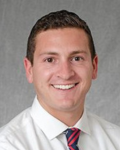
Andrew C. Meltzer, MD, MS
Prinicipal Investigator
Andrew C. Meltzer, MD, MS FACEP is a Professor of Emergency Medicine and the Chief of the Clinical Research Section at the George Washington University School of Medicine. He completed his MD at SUNY Downstate, residency in Emergency Medicine at the University of Maryland and R Adams Cowley Shock Trauma Center, and his fellowship in Clinical Research at the University of Maryland. Andrew Meltzer, MD, is a Fellow of the American College of Emergency Physicians (ACEP) and member of the ACEP Clinical Policies Committee and the Society of Academic Emergency Medicine (SAEM) Research Committee.

Christopher J. Payette, MD
Co-Investigator
Christopher Payette, MD is an Assistant Professor of Emergency Medicine at The George Washington University School of Medicine and Health Sciences where he also serves as an Associate Program Director to the residency program. He completed his residency in Emergency Medicine at GW and a fellowship in Clinical & Translation Research. Dr. Payette received his BS in Biological Anthropology at The George Washington University in 2014 and his MD in 2018. He is interested in research (particularly related to health equity, injury prevention, and social determinants of health) and medical education as he grows his practice in the field of emergency medicine.

Daniel I. Shpigel, MD
Co-Investigator
Daniel Shpigel, MD earned his Bachelor of Science in Business Administration from the LeBow College of Business at Drexel University. He went on to receive his medical degree from Thomas Jefferson University, where he also completed his residency in Emergency Medicine. At Thomas Jefferson University's Health Design Lab, he facilitated design thinking workshops and explored the effects of public space design on community health. Presently, Dr. Shpigel serves as an attending emergency physician and is a Medical Leadership and Operations Fellow in the George Washington University Department of Emergency Medicine. Concurrently, he is pursuing his MBA at the GW School of Business. Dr. Shpigel has been involved in numerous projects in healthcare administration, with focal areas in EMR optimization, emergency department intake and throughput, clinical protocols, tele-scribing, and more.

Ryan Heidish
Research Coordinator
Ryan Heidish is a clinical research coordinator serving the department since 2023. Ryan graduated with a Bachelors of Science from the Georgia Institute of Technology in 2022, and worked as an EMT in Atlanta, Georgia in both event medicine and 911 operations before moving to Washington, DC. As a research coordinator, Ryan has participated in many clinical trials focusing on point-of-care technology, social determinants of health, and other aspects of clinical management in the acute care setting. Ryan will be starting medical school at the George Washington University School of Medicine and Health Sciences in the Fall of 2025.

Aditya Loganathan
Research Coordinator
Aditya earned his Bachelor’s degree in Cell and Molecular Biology from the George Washington University and is currently pursuing an MBA at the George Washington University School of Business. He began his work in the Department of Emergency Medicine as a research assistant from 2022 to 2023 before transitioning into his current role as a clinical research coordinator. In addition to his research responsibilities, Aditya serves as the teaching assistant for EHS 2107: Theory and Practice of Clinical Research and is the project manager forUrgent Matters, a national initiative focused on innovation and quality improvement in emergency care.

Isabella Lagunzad, MPH
Research Coordinator
Izzy is a passionate public health professional working in emergency medicine (EM) clinical research, with a Master of Public Health (MPH) in Epidemiology. Prior to her transition into research, she spent four years as an Emergency Medical Technician (EMT), gaining invaluable frontline experience in both 911 EMS and emergency department settings. She is particularly drawn to psychiatric and clinical epidemiology and is driven by a commitment to advancing health equity, improving patient outcomes, and contributing to research that makes a tangible impact.
- Research Assistants
-
Taylor Bolden
Tarun Loganathan
- Medical Students
-
Cal Morrison ('23 Gill Fellow)
Matteo Pieri ('24 HSS Fellow)
William Huang ('24 HSS Fellow)